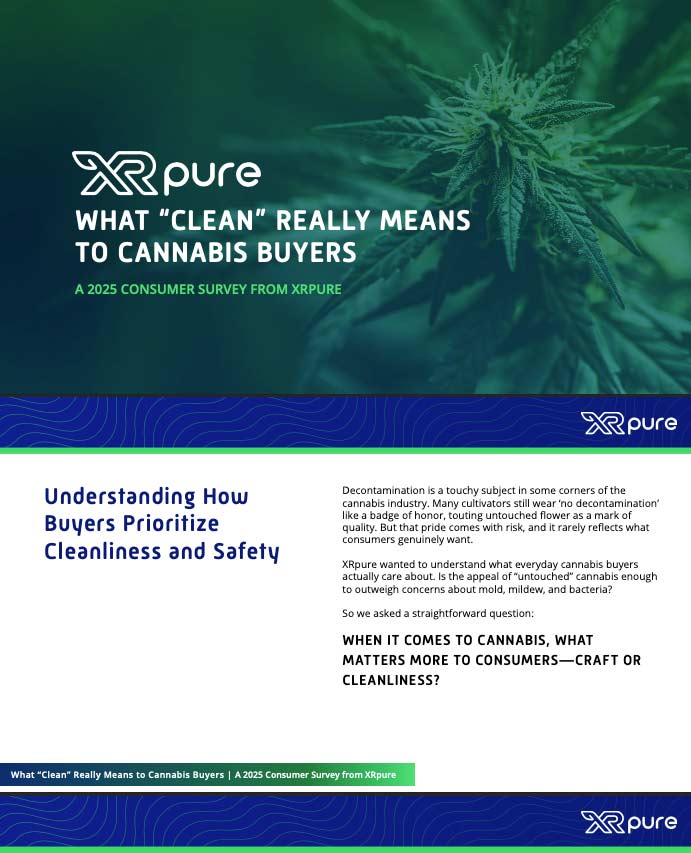Actionable steps to help brands address recalls, rebuild reputations, and safeguard future products.
Cannabis recalls are soaring across the U.S., creating an inflection point for brands facing intense scrutiny. In California, recalls surged to 23 cases in just the first half of 2024—almost triple the previous two years combined. Missouri issued two massive recalls this year affecting over 135,000 products, while Maine recently pulled flower and pre-rolls off shelves due to contamination.
Takeaways for Cannabis Brands
With the rise in recalls, the message is clear: cannabis brands must prepare. Here’s how brands can move forward following a recall.
- Learn from the Experience
Analyze the recall circumstances, identifying lapses in quality control, testing protocols, or tracking procedures. A systematic review reveals patterns in contamination sources or production stages where oversights occur. - Invest in Proactive Measures
Recalls are preventable. Investing in advanced cannabis decontamination solutions, like XRpure’s XR16, can significantly reduce risks. These solutions neutralize common contaminants like mold, yeast, and bacteria without altering product quality. - Build Resilience through Safety and Transparency
Transparency can turn a recall into a reputation-building moment. Brands that prioritize consumer safety and back it up with transparency can transform setbacks into long-term marketplace resilience.
Understanding the Impact of a Cannabis Recall
The consequences of a recall are severe for cannabis brands. Financially, recalls can mean significant losses due to halted sales, disposal costs, and fines. Reputationally, recalls erode consumer trust, which is challenging to rebuild in a competitive market. Operationally, brands must contend with inventory recalls, warehouse adjustments, and restructured distribution—all demanding resources and careful coordination.
Post-Recall Steps
It’s all about swift, organized action. Start by promptly notifying regulatory authorities and meeting all legal compliance steps. Document every communication and follow directives carefully to avoid penalties and demonstrate accountability.
Next, inform retailers, distributors, and partners, giving them clear instructions for handling recalled products. This will maintain supply chain trust and ensure that affected products are removed from the market.
Finally, address your customers directly. Develop a communication strategy, outline resolution steps, and affirm your commitment to safety. Transparency is critical here—open communication protects your reputation and builds consumer trust.
Conducting a Root Cause Analysis
After a recall, examine every production stage to identify where contamination or errors occurred. Isolating the root cause gives brands a roadmap toward implementing solutions to prevent future issues.
Strength Quality Control and Compliance Protocols
Begin with Quality Assurance (QA) steps:
- Establish rigorous testing protocols
- Regularly audit production stages
- Maintain thorough documentation for every batch
Integrate advanced cannabis decontamination solutions like those from XRpure to tackle any possible contaminants. Also, enhance your testing and product monitoring practices. Implement routine spot-checks, invest in comprehensive testing equipment, and closely monitor compliance metrics.
Rebuilding Trust with Customers and Partners
- Craft a transparent recall response campaign that explains the recall, outlines corrective actions, and reaffirms your commitment to product safety.
- Leverage social media and PR channels to address consumer concerns, provide updates, and share your ongoing safety efforts.
- Consider offering support to affected customers through refunds, discounts, or educational resources on product safety.
Turn a challenging situation into an opportunity to reinforce loyalty.
Creating a Proactive Recall Prevention Plan
A proactive recall prevention plan starts with a comprehensive preparedness strategy that includes defined roles, communication protocols, and procedures for addressing product issues. Other pieces of the plan include regular audits and quality assessments throughout the production process.
Then, there are post-harvest decontamination solutions, such as those delivered by XRpure’s advanced X-ray technology. XRpure reduces microbial contaminants like mold and bacteria without altering product quality.
Connect with XRpure today and get back on track post-recall.
